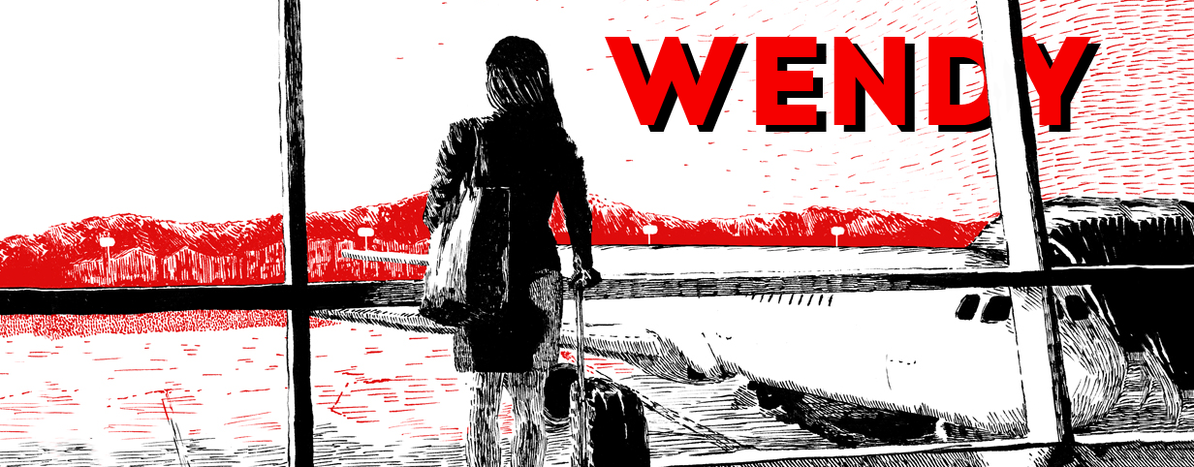
Wendy: an Ecuadorian trans who dreamed of Europe
Published on
Wendy was born in the wrong body. Since her childhood in Ecuador in the 1980s, she has been struggling for her female identity to be recognised by her relatives. Fleeing a country where homosexuality was illegal until 1997, Wendy decided to rebuild her life in Europe. After 25 years as a sex worker, she is finally proud of the woman she has become.
This portrait was written by Sans A_.
The bite marks are deep. Much deeper than those you get from stray dogs in the 'suburbios' of Guayaquil, the first ever city in Ecuador. They are invisible, tenacious. They are bite marks of shame. In December 1985, the 10-year-old Leo* is standing there–in the amphitheatre of his school. Professors and students have gathered on the occasion of the school year ending. The headmistress steps forwards and, without a hint of compassion, announces that: "Leo is a boy who believes he is a girl." The cat is out of the bag. With the weight of everyone's stares, shame overwhelms her. Trying to get rid of the bite marks and trembling with anger, Leo kicks the headmistress to avenge her humiliation.
"From the age of three, I knew that I was a woman born in a man's body," Leo murmurs, or rather Wendy*–the name she has been using since she started working. Wendy is now 42 years old. She taps her nails on the coffee table with a sense of malice in her eyes, her cheekbones portruding. Wendy has settled in a cosy apartment tucked away in a small courtyard in the centre of Nantes. This is where she lives, and this is where she sees her clients. "Old people, young people, blacks, whites, all kinds of occupations," she explains. They pay 150 Euros per hour. "That's more than the girls in East France who work the street for 50 Euros, but at home there's comfort, discretion and a shower." She fixes one of her wild brown locks and exhales: "I've been doing this job for 20 years."
Trapped in a man's body
It's also been 20 years since she left her home country, Ecuador. Her family held a bazaar at the ground floor of their house, in one of Guayaquil's working-class neighbourhoods. "We were poor but I didn't know," she explains, "When you're small, wealth and poverty are strange concepts." He parents divorced at a young age, her father left the house and her mother went to work in Venezuela. Leo, the eldest of the family, was raised by her grandmother and her aunt who was a teacher in her school. Her boy body bothers her. "At the age of 10, I started to question what was happening to me. Unlike my classmates, I wasn't attracted to girls and football didn't interest me. Transgenders are born with this feeling of difference. Others say we're strange and we start to internalise that." She dealt with the mockery by becoming part of a gang of malicious rebels with which she painted the town red. "We were rebelling against an unjust system. It was a very hypocritical and conservative era in Ecuador, where homosexuality would get you incarcerated and the only thing sex ed taught you was abstinence until marriage."
This gang was like a protective cocoon for her. "I was dressed like a boy but the adults thought I was a girl. My friends didn't make me feel that difference. It's adults that disapprove, children don't judge. If some people are bad, it's because of the intolerance their parents instilled in them." Her attitude embarrassed people. The neighbours made unkind remarks. She wanted to explain to her family that she was sure to be a woman trapped in a man's body. It was impossible to do so directly; she was afraid to hurt them or face the consequences. So she confidently decided to speak to her teacher, "because she was a woman, she was cultured and I thought she could understand me." She asked her to speak to her aunt, who was also a teacher at the school. But instead of doing so, the teacher went directly to the headmistress who then humiliated Wendy in front of the entire school. "After the kick, I was expelled from the school."
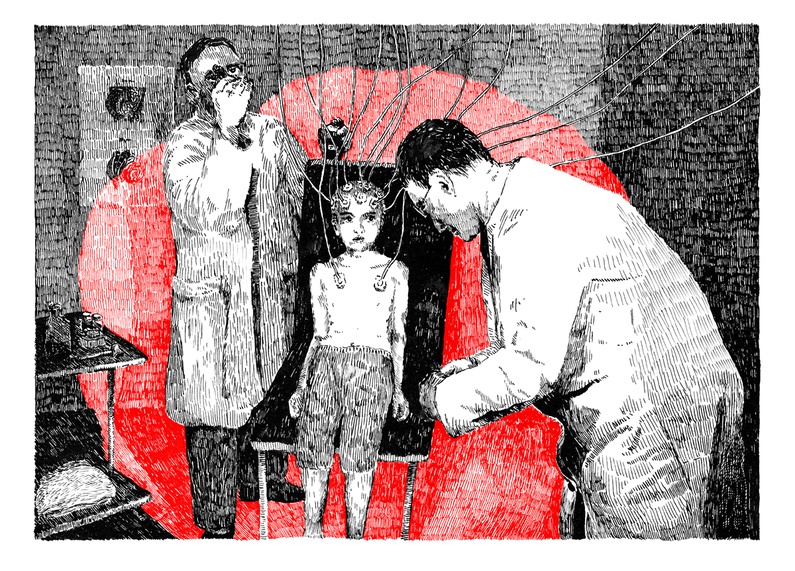 And so the slow descent into hell began. "My aunt was hurt by the news. She didn't know how to react, so she took me to see two shrinks. They didn't understand what I was going through either. They put electrodes on my head, they wanted to give me male hormones, they had no solution. I won't hold it against my aunt, it was the only option she could offer." Electrodes, hormones and psychologists didn't help. Leo still felt like a woman. Her aunt then decided to sign her up to attend a professional Catholic school. Another failed attempt: Wendy ran away to avoid another humiliating punishment."I took my stuff and I left the house when I was 11 years old. Escape seemed like the only feasible option."
And so the slow descent into hell began. "My aunt was hurt by the news. She didn't know how to react, so she took me to see two shrinks. They didn't understand what I was going through either. They put electrodes on my head, they wanted to give me male hormones, they had no solution. I won't hold it against my aunt, it was the only option she could offer." Electrodes, hormones and psychologists didn't help. Leo still felt like a woman. Her aunt then decided to sign her up to attend a professional Catholic school. Another failed attempt: Wendy ran away to avoid another humiliating punishment."I took my stuff and I left the house when I was 11 years old. Escape seemed like the only feasible option."
Under the wings of the Guayaquil trans community
She found shelter in Erika's house, a trans hairdresser she met in an underground bar in Guayaquil. "At that time, most of the transgender people ran hair salons," she recalls, "It was one of the only professions that homosexuals and trans people could do without being persecuted." Erika took Wendy under her wing. "She had a room behind the salon where I could sleep. Every day, I participated in household chores. I was brooming the salon, I would do the groceries, and she taught me how to cook and cut hair, so that became my profession." Wendy learned how to live alone but she was missing her family. "I was suffering from not seeing them, especially in knowing that they were not looking for me. It was easy for them, I was not so far away. But maybe they knew that they couldn't do anything for me, that I had to find myself on my own."
On a morning like any other, Wendy sat by the window in her room. She watched passersby walking along the street. Suddenly, all heads turned and stared at a beautiful creature. "She walked slowly, with confidence. It was the era of break-dancing. She wore a sublime tracksuit and a lot of jewellery. I remember her face as if it were yesterday. Her long hair made her look like she could be one of Charlie's Angels. An androgynous style, very chic and glamorous. A transsexual. That's when it hit me: this is what I want to be! I won't go back home until I become like her: rich, feminine and beautiful."
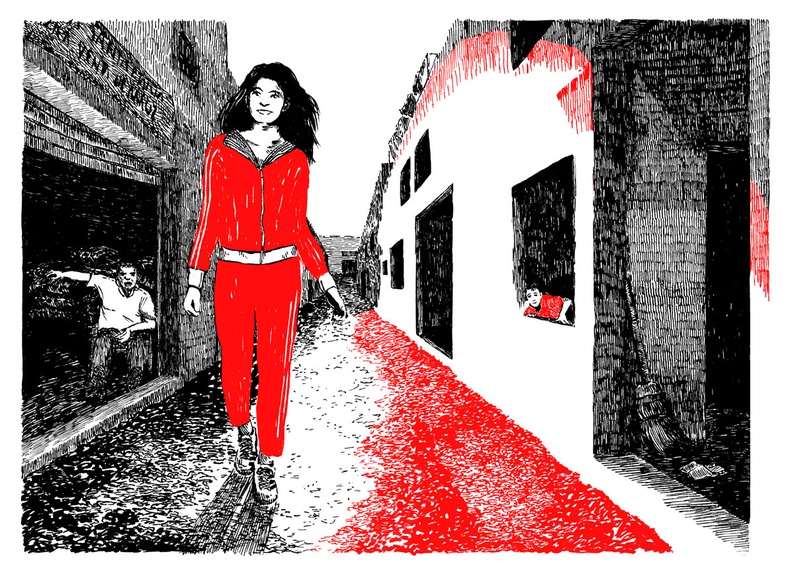 In the late 1980s, the Ecuadorian transgender community was hit by a wave of departures. Many representatives of the community abandoned their careers and their homes to take a chance on the European adventure. "It was like a trend," says Wendy. "Everyone was leaving to work as prostitutes in Paris. I had never been a prostitue in the past, but I followed the trend out of curiosity." Wendy managed to get a tourist visa to the Netherlands, and borrowed money from a friend for the plane ticket. "It was too complicated to find a French visa so we all went through Amsterdam." She was hosted by Ecuadorian friends and started working immediately.
In the late 1980s, the Ecuadorian transgender community was hit by a wave of departures. Many representatives of the community abandoned their careers and their homes to take a chance on the European adventure. "It was like a trend," says Wendy. "Everyone was leaving to work as prostitutes in Paris. I had never been a prostitue in the past, but I followed the trend out of curiosity." Wendy managed to get a tourist visa to the Netherlands, and borrowed money from a friend for the plane ticket. "It was too complicated to find a French visa so we all went through Amsterdam." She was hosted by Ecuadorian friends and started working immediately.
"The first time, it was like a game. You see these cute men that are going to pay you; it's comforting in a way, but when the act begins, it's a shock. Because you're going to do things you're not used to. A man will touch your genitals... It was not the first time I had slept with men, but it was very different–even scary. A romantic relationship was beyond comparison. We all came from a conservative country; in Holland it was more open, and more perverse. You find a sort of sexual freedom, and you discover a new body."
The hell of Bois de Boulogne
Wendy stayed in Amsterdam for two weeks before leaving for the French adventure with a friend. They had found a smuggler in Brussels: 1000 Dollars to get to Paris. They squeeze in with three other Latin Americans and headed for the Bois de Boulogne. "When I arrived in Paris it was hell, pure hell! We had to work outside in the blistering cold, against the trees. Sometimes, during the act, you realise that 15 men are looking at you and masturbating. You let it happen, because that's what you've seen in porn." She remembers clients that were scared of the police. Policemen were chasing down prostitues in the forest. "In those days, they would arrest us every day." After one month of playing cat and mouse, Wendy was arrested and sent to the remand centre in Nanterre. She spent 15 days there in isolation because of her being trans, and was sent back to Ecuador. "All the transgender people wanted to earn enough money to help their families back home." For Wendy, it was back to square one.
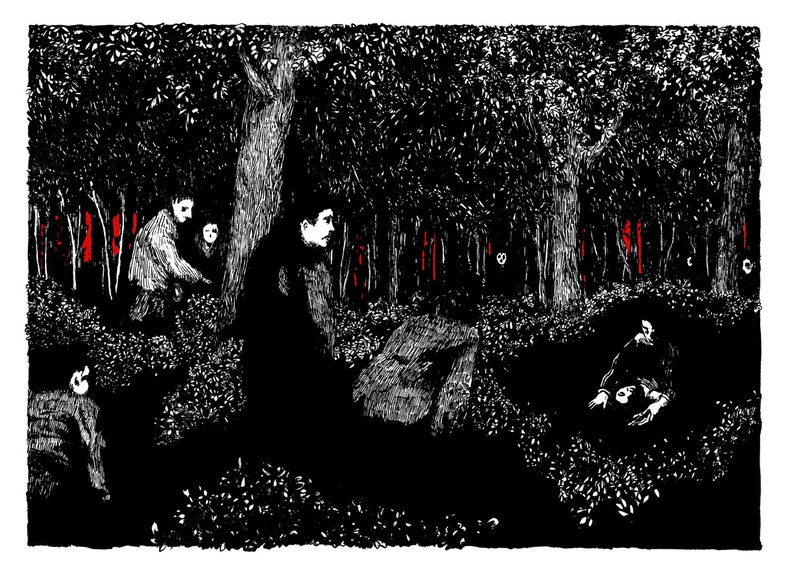 She returns to her work at the hairdresser salon. It was also an opportunity to get back in touch with her family. She finds her mother who she hasn't seen since her escape at 11 years old. The exchange is cordial, almost welcoming: "She told me: 'I accept you as you are,' and it comforted me." Wendy found out that her father was looking for her as well. She invites him to the salon, hoping to take revenge after 15 years of absence. She puts on a mini-skirt and a revealing top, caking on layers of make-up. "When he walked in, I said hello and he didn't recognise me. He sat down, and after a few minutes came up to me and said: 'It's you.' He wasn't angry, because he's a well-mannered man, an accountant in a company. The only option he had was accepting me as I was, and he knew that. That's a lesson I've learned since then: if you accept who you are, others will accept you too."
She returns to her work at the hairdresser salon. It was also an opportunity to get back in touch with her family. She finds her mother who she hasn't seen since her escape at 11 years old. The exchange is cordial, almost welcoming: "She told me: 'I accept you as you are,' and it comforted me." Wendy found out that her father was looking for her as well. She invites him to the salon, hoping to take revenge after 15 years of absence. She puts on a mini-skirt and a revealing top, caking on layers of make-up. "When he walked in, I said hello and he didn't recognise me. He sat down, and after a few minutes came up to me and said: 'It's you.' He wasn't angry, because he's a well-mannered man, an accountant in a company. The only option he had was accepting me as I was, and he knew that. That's a lesson I've learned since then: if you accept who you are, others will accept you too."
A transatlantic dream
Two months later, Wendy decided to try the European adventure again and arrived in Brussels. It's 1989 and the Belgian law is more tolerant towards prostitution, allowing Wendy to earn 33 000 Belgian Francs a day (about 1000 Dollars at the time). She rented a room and worked independently for three months until her visa expired. "Then we would leave the country and get another visa. In Denmark, for example." This technique allowed her to stay in Europe without running the risk of being deported. For 5 years, Wendy travelled around the continent by plane, working in Amsterdam, Paris, Brussels, Antwerp, Luxembourg, Madrid, Barcelona, Geneva, Zurich and Basel. These were good times.
She wanted to settle in France but the threat of being sent to prison led her to Spain. In order to get the right papers, she declared herself a housekeeper but discreetly continued to work as a prostitue on the side. She tried to find a new job, "but as a foreigner and a transgender, what other work can you find? The bosses look at you as if you were a monkey." Years pass, Wendy pays her taxes and ends up obtaining the Spanish nationality. A luxury that allows her to travel and settle wherever she wants in Europe. Her situation is finally stable, and she decides to bring her family over. "I found housing in Ibiza for my mother, and I brought my cousins, my aunts and my uncles to Spain. Now, in Guayaquil, having a trans child is seen as a good thing–they bring money and beautiful things from Europe."
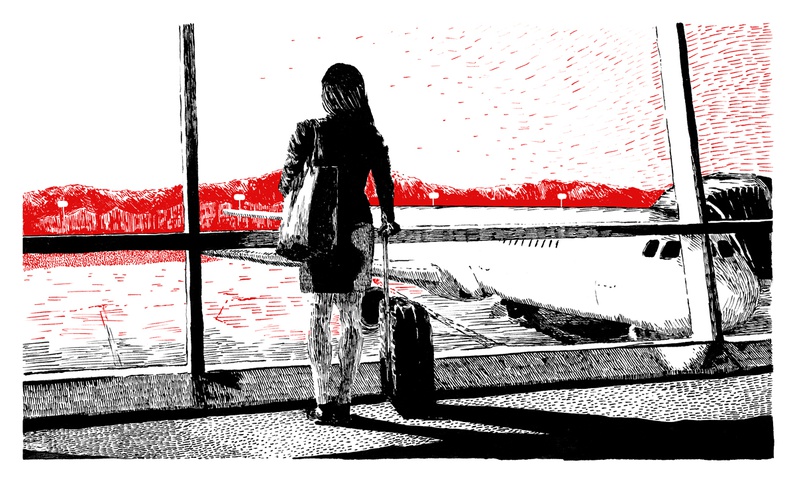 Sometimes Wendy comes back to France, because "this is where I have the most customers," she says. "The French love transgenders. They have a lot of fantasies with us, they are less sociable than the Spaniards but much warmer in their private lives. The French always say: 'I want to try, just to try.' But they come back to try time and time again." Their working-lives lead to vices. To avoid them, Wendy stays cautious–refusing indecent or dangerous proposals. "Some clients want to do it without a condom or ask you to take coke. I refuse. I have seen friends succumb to drugs and alcohol. If you are not careful, prostitution can lead to self-destruction. Others will enjoy your beauty and your vulnerability. So you end up being just a ghost."
Sometimes Wendy comes back to France, because "this is where I have the most customers," she says. "The French love transgenders. They have a lot of fantasies with us, they are less sociable than the Spaniards but much warmer in their private lives. The French always say: 'I want to try, just to try.' But they come back to try time and time again." Their working-lives lead to vices. To avoid them, Wendy stays cautious–refusing indecent or dangerous proposals. "Some clients want to do it without a condom or ask you to take coke. I refuse. I have seen friends succumb to drugs and alcohol. If you are not careful, prostitution can lead to self-destruction. Others will enjoy your beauty and your vulnerability. So you end up being just a ghost."
Stilettos
She deals with the harshness of the profession like a business. "I don't take risks, I only pay for what I can afford and I take care of my hygiene. You have to pay attention to the product you're selling..." She removes the coffee pot from the heat. "It's not only my body I'm selling. Men don't just come for sex. Sex is the end result. What I really sell is a discovery. Men do with me what they can't do at home. A husband who likes to dress up as a woman but can't do that with his wife will do it with me. I put them at ease. The trans have an aura of mystery for many men."
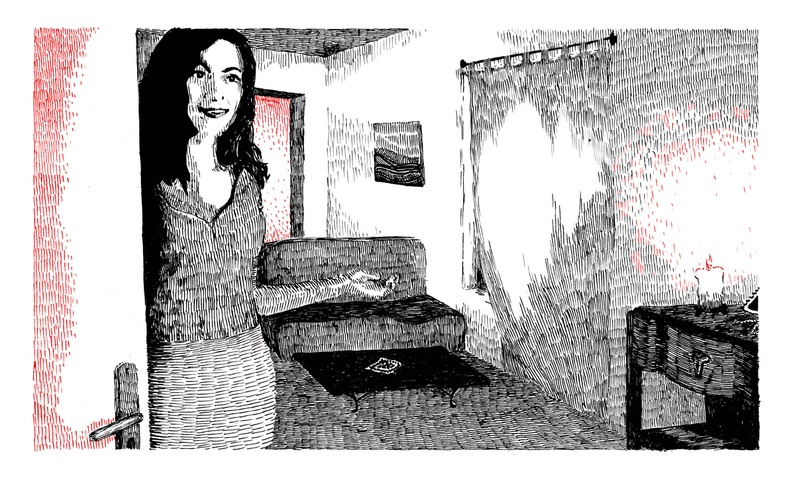 Wendy has given up on the Bois de Boulogne and the stress of Parisian life to settle in Nantes. She arrived by chance, and has stayed for the peace and quiet. Here, she doesn't mix with other prostitutes because she fears that the police will think they are a mafia. "If I take a girl roommate in my apartment, I can be accused of pimping." So she stays alone with Wesley, her dog, who escapes through the patio door. She catches him before playing with him. She has named him after Wesley Snipes, the American actor. Her life, she claims, resembles an Almodóvar movie: "He is ironic, he tells the truth by hiding it. Just like we–transgenders–do."
Wendy has given up on the Bois de Boulogne and the stress of Parisian life to settle in Nantes. She arrived by chance, and has stayed for the peace and quiet. Here, she doesn't mix with other prostitutes because she fears that the police will think they are a mafia. "If I take a girl roommate in my apartment, I can be accused of pimping." So she stays alone with Wesley, her dog, who escapes through the patio door. She catches him before playing with him. She has named him after Wesley Snipes, the American actor. Her life, she claims, resembles an Almodóvar movie: "He is ironic, he tells the truth by hiding it. Just like we–transgenders–do."
The return of the extravagant woman
Nowadays, she refuses to work the street and doesn't go to see her clients. "I'm scared that they'll kill me and bury me in the garden," she sighs, "You take risks every single day in this business. You can come across psychopaths. I have never been robbed or raped, but I know many colleagues who have." She only uses classified websites. Thanks to her European status, if there's an emergency she can call the police without fear. As a practicing Catholic, she leaves a lit candle next to her altar for the Virgin Mary, which is propped up against one of the pink walls in her living room. "You never know." Each week, she earns at least 9000 Euros for a dozen of customers. "Before the crisis in 2008, I earned about 5000 Euros per month. These days I earn less because I work less. I'm close to the end. I kept my goals in mind. I bought six houses in Ecuador and helped my family."
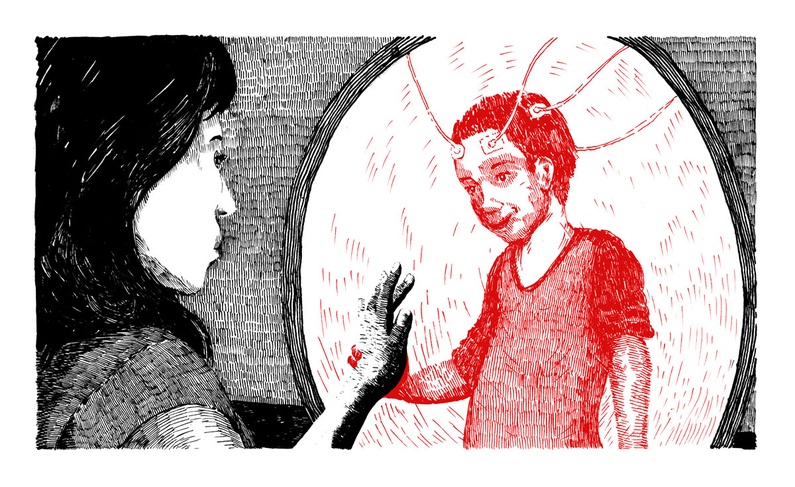 Next year: it's certain. She is going to put an end to all of this. "I don't want to end up feeling empty. I want to feel alive." She plans to return to her home-country and open a catering or personal stylist service. She misses Ecuador. The last time she went home for Christmas, she knocked at her aunt's office in her old school. The headmistress opened the door. Wendy jumped. The headmistress looked at hear, without recognising the child she had humiliated. Had she feigned ignorance because of shame, of guilt? Wendy likes to think so. "It doesn't matter," she says, "I have fulfilled my dream. I can die in peace because I know that my family and friends will miss me." In the street where she grew up, all eyes are now on Wendy. She's convinced that the young Leo would be proud of the woman he has become.
Next year: it's certain. She is going to put an end to all of this. "I don't want to end up feeling empty. I want to feel alive." She plans to return to her home-country and open a catering or personal stylist service. She misses Ecuador. The last time she went home for Christmas, she knocked at her aunt's office in her old school. The headmistress opened the door. Wendy jumped. The headmistress looked at hear, without recognising the child she had humiliated. Had she feigned ignorance because of shame, of guilt? Wendy likes to think so. "It doesn't matter," she says, "I have fulfilled my dream. I can die in peace because I know that my family and friends will miss me." In the street where she grew up, all eyes are now on Wendy. She's convinced that the young Leo would be proud of the woman he has become.
* all names were modified
A story told by Matteo Maillard, illustrated by Manon Baba.
---
This portrait was created by Sans A_ whose mission it is to make the invisible visible, and encourage their community to act. For their 6th season, "Prostitues speak out", Sans A_ has given a voice to those who work in prostitution. Discover this series on: www.sans-a.fr.
Translated from Wendy, rêves européens d'une trans équatorienne



